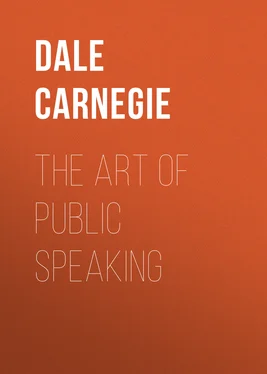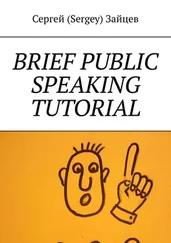Former United States Senator Albert J. Beveridge in an introduction to one of the volumes of "Modern Eloquence," says: "The profoundest feeling among the masses, the most influential element in their character, is the religious element. It is as instinctive and elemental as the law of self-preservation. It informs the whole intellect and personality of the people. And he who would greatly influence the people by uttering their unformed thoughts must have this great and unanalyzable bond of sympathy with them."
When the men of Ulster armed themselves to oppose the passage of the Home Rule Act, one of the present writers assigned to a hundred men "Home Rule" as the topic for an address to be prepared by each. Among this group were some brilliant speakers, several of them experienced lawyers and political campaigners. Some of their addresses showed a remarkable knowledge and grasp of the subject; others were clothed in the most attractive phrases. But a clerk, without a great deal of education and experience, arose and told how he spent his boyhood days in Ulster, how his mother while holding him on her lap had pictured to him Ulster's deeds of valor. He spoke of a picture in his uncle's home that showed the men of Ulster conquering a tyrant and marching on to victory. His voice quivered, and with a hand pointing upward he declared that if the men of Ulster went to war they would not go alone—a great God would go with them.
The speech thrilled and electrified the audience. It thrills yet as we recall it. The high-sounding phrases, the historical knowledge, the philosophical treatment, of the other speakers largely failed to arouse any deep interest, while the genuine conviction and feeling of the modest clerk, speaking on a subject that lay deep in his heart, not only electrified his audience but won their personal sympathy for the cause he advocated.
As Webster said, it is of no use to try to pretend to sympathy or feelings. It cannot be done successfully. "Nature is forever putting a premium on reality." What is false is soon detected as such. The thoughts and feelings that create and mould the speech in the study must be born again when the speech is delivered from the platform. Do not let your words say one thing, and your voice and attitude another. There is no room here for half-hearted, nonchalant methods of delivery. Sincerity is the very soul of eloquence. Carlyle was right: "No Mirabeau, Napoleon, Burns, Cromwell, no man adequate to do anything, but is first of all in right earnest about it; what I call a sincere man. I should say sincerity, a great, deep, genuine sincerity, is the first characteristic of all men in any way heroic. Not the sincerity that calls itself sincere; ah no, that is a very poor matter indeed; a shallow braggart, conscious sincerity, oftenest self-conceit mainly. The great man's sincerity is of the kind he cannot speak of—is not conscious of."
It is one thing to convince the would-be speaker that he ought to put feeling into his speeches; often it is quite another thing for him to do it. The average speaker is afraid to let himself go, and continually suppresses his emotions. When you put enough feeling into your speeches they will sound overdone to you, unless you are an experienced speaker. They will sound too strong, if you are not used to enlarging for platform or stage, for the delineation of the emotions must be enlarged for public delivery.
1. Study the following speech, going back in your imagination to the time and circumstances that brought it forth. Make it not a memorized historical document, but feel the emotions that gave it birth. The speech is only an effect; live over in your own heart the causes that produced it and try to deliver it at white heat. It is not possible for you to put too much real feeling into it, though of course it would be quite easy to rant and fill it with false emotion. This speech, according to Thomas Jefferson, started the ball of the Revolution rolling. Men were then willing to go out and die for liberty.
PATRICK HENRY'S SPEECH
BEFORE THE VIRGINIA CONVENTION OF DELEGATES
Mr. President, it is natural to man to indulge in the illusions of hope. We are apt to shut our eyes against a painful truth, and listen to the song of that siren, till she transforms us to beasts. Is this the part of wise men, engaged in a great and arduous struggle for liberty? Are we disposed to be of the number of those who, having eyes, see not, and having ears, hear not, the things which so nearly concern our temporal salvation? For my part, whatever anguish of spirit it may cost, I am willing to know the whole truth; to know the worst, and to provide for it.
I have but one lamp by which my feet are guided; and that is the lamp of experience. I know of no way of judging of the future but by the past. And judging by the past, I wish to know what there has been in the conduct of the British Ministry for the last ten years to justify those hopes with which gentlemen have been pleased to solace themselves and the House? Is it that insidious smile with which our petition has been lately received? Trust it not, sir; it will prove a snare to your feet. Suffer not yourselves to be "betrayed with a kiss"! Ask yourselves, how this gracious reception of our petition comports with those warlike preparations which cover our waters and darken our land. Are fleets and armies necessary to a work of love and reconciliation? Have we shown ourselves so unwilling to be reconciled, that force must be called in to win back our love? Let us not deceive ourselves, sir. These are the implements of war and subjugation, the last "arguments" to which kings resort.
I ask gentlemen, sir, what means this martial array, if its purpose be not to force us to submission? Can gentlemen assign any other possible motive for it? Has Great Britain any enemy in this quarter of the world, to call for all this accumulation of navies and armies? No, sir, she has none. They are meant for us; they can be meant for no other. They are sent over to bind and to rivet upon us those chains which the British Ministry have been so long forging. And what have we to oppose to them? Shall we try argument? Sir, we have been trying that for the last ten years. Have we anything new to offer upon the subject? Nothing. We have held the subject up in every light of which it is capable; but it has been all in vain. Shall we resort to entreaty and humble supplication? What terms shall we find which have not been already exhausted? Let us not, I beseech you, sir, deceive ourselves longer. Sir, we have done everything that could be done, to avert the storm which is now coming on. We have petitioned, we have remonstrated, we have supplicated, we have prostrated ourselves before the throne, and have implored its interposition to arrest the tyrannical hands of the Ministry and Parliament. Our petitions have been slighted; our remonstrances have produced additional violence and insult; our supplications have been disregarded, and we have been spurned with contempt from the foot of the throne. In vain, after these things, may we indulge in the fond hope of peace and reconciliation. There is no longer any room for hope. If we wish to be free, if we mean to preserve inviolate those inestimable privileges for which we have been so long contending; if we mean not basely to abandon the noble struggle in which we have been so long engaged, and which we have pledged ourselves never to abandon until the glorious object of our contest shall be obtained, we must fight; I repeat it, sir, we must fight! An appeal to arms, and to the God of Hosts, is all that is left us!
They tell us, sir, that we are weak—"unable to cope with so formidable an adversary"! But when shall we be stronger? Will it be the next week, or the next year? Will it be when we are totally disarmed, and when a British guard shall be stationed in every house? Shall we gather strength by irresolution and inaction? Shall we acquire the means of effectual resistance, by lying supinely on our backs, and hugging the delusive phantom of hope, until our enemies have bound us hand and foot? Sir, we are not weak, if we make a proper use of those means which the God of Nature hath placed in our power. Three millions of people, armed in the holy cause of Liberty, and in such a country as that which we possess, are invincible by any force which our enemy can send against us. Besides, sir, we shall not fight our battles alone. There is a just Power who presides over the destinies of nations, and who will raise up friends to fight our battles for us. The battle, sir, is not to the strong alone; it is to the vigilant, the active, the brave. Besides, sir, we have no election. If we were base enough to desire it, it is now too late to retire from the contest. There is no retreat, but in submission and slavery. Our chains are forged. Their clanking may be heard on the plains of Boston. The war is inevitable; and let it come! I repeat it, sir, let it come! It is in vain, sir, to extenuate the matter. Gentlemen may cry "Peace, peace!" but there is no peace! The war is actually begun! The next gale that sweeps from the north will bring to our ears the clash of resounding arms! Our brethren are already in the field! Why stand we here idle? What is it that gentlemen wish? What would they have? Is life so dear, or peace so sweet, as to be purchased at the price of chains and slavery? Forbid it, Almighty Powers!—I know not what course others may take; but as for me, give me liberty or give me death!
Читать дальше












